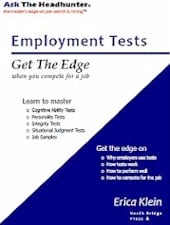In the December 10, 2013 Ask The Headhunter Newsletter, a reader has a friend who doesn’t do well on tests:
A friend of mine has an important job interview coming up. It’s for a pretty high level job. Before she goes to the interview, they want her to do a personality type of test, and she’s very worried because she doesn’t test well. Her idea is to have someone else do the online test for her because no one would know. I think that’s cheating, but I understand her concern — she could miss out on a really good job over a test that won’t mean anything once she starts the job. Is there any way they could find out it’s not really her taking the test?
Nick’s Reply
That’s a scary question.
 We live under an employment system where people think they can buy resumes, interview answers, keywords and clever methods to beat the filters employers set up when they’re recruiting.
We live under an employment system where people think they can buy resumes, interview answers, keywords and clever methods to beat the filters employers set up when they’re recruiting.
There are about five issues of integrity in your question, but all I’ll say about this in general is, don’t lie, don’t cheat, don’t fake who you are. Even if you survive the guilt and even if you beat the risks, there’s a good chance that the “payoff” might be that you’ll “win” a job that’s not right for you because you misrepresented yourself. Doesn’t your friend understand that this is a big part of employment testing? It can be to her benefit as well as the employer’s to do the test honestly.
My second point: I don’t like employment tests. I wish employers didn’t use them. If they’re going to truly assess a job applicant, they should do it directly, by spending time with the applicant and observing them in real-life work situations. Not indirectly through tests. So there’s my personal bias.
Now let’s put all this aside and deal with the very real problem of getting busted, because cheating on employment tests isn’t an option.
I recently published a book everyone should read long before they go job hunting in earnest: Employment Tests: Get The Edge… when you compete for a job, by Erica Klein. It’s the first book under the Ask The Headhunter imprint that I didn’t write — and it’s a key “insider’s edge” to getting ahead of your competition.
Don’t wait until you’re faced with an employment test, because it’s not a matter of whether you’ll have to take one of these tests (and there are many kinds — Erica’s book covers the gamut) but of when. If you’re not ready to deal with employment tests, you’re toast.
Your question is the perfect example of how ignorance about employment tests could needlessly cost you a great job — or even get you into bigger trouble. (Yes, bigger trouble. Read on.) There’s a section of the book that addresses your very scary question very directly, and I’m just going to reprint it below.
From Employment Tests: Get The Edge by Erica Klein (pp. 9-10):
What about cheating?
High quality pre-employment testing benefits both employers and job applicants by matching them to help ensure mutual success. One way to think about cheating is that, if you cheat, you can hurt yourself by getting shoe-horned into a job that is not a good fit for you.
What is considered cheating? Usually the rules for taking the test are laid out for you before you start the test. Rules for test taking vary but usually require doing your own work, answering factual questions honestly, not accepting help from anyone else and not accessing other sources of information while taking the test. The rules for different tests will vary. For example, some tests allow you to use a calculator and some will specifically instruct you not to use a calculator.
Some tests are set up to catch certain kinds of cheating. One increasingly common practice is to provide two versions of the same test. The first test you take is “unproctored” — you take it from your own computer and nobody is watching you. If you are in the top group of applicants, you might be invited to take the test again, but in a proctored environment where you are watched while you take the test and your identity is verified. If your score on the second, proctored test is significantly lower than the score on the unproctored test, then the employer assumes you probably cheated and excludes you from further consideration.
[Get it? There’s nothing to stop an employer from insisting that your friend take the test a second time, with someone watching. -Nick]
Applicants sometimes try to get a better score on personality or integrity tests by choosing answers that reflect what they believe would be a perfect person’s answers. Test manufacturers are aware of this strategy and they have built in “lie detector” scales that catch applicants who portray themselves as perfect people with no flaws. This is sometimes called “claiming uncommon virtues” or “faking good.” If you score high on a built-in lie scale, you may be excluded from consideration for the position. One example of a question that could be part of an uncommon virtue/lie scale is “Have you ever told a lie no matter how small?” It is a rare individual who has never told even a small lie in his or her entire life.
I mentioned that ignorance about testing can lead to bigger trouble. Erica adds this warning in one of the many Get The Edge sidebars in the book:
If you get caught cheating on pre-employment tests, you might ruin your chances for employment not only in the job you applied for, but also with that employer, and even possibly with other clients of the test vendor.
That’s right: Cheat on one test, and you could get blown out of many jobs, because the test vendor can keep track of your results from one employer to the next.
It’s quite an industry, isn’t it? That’s why I asked Erica Klein to write this book. It’s rare for someone like her — a specialist in employment testing — to address job seekers. Industrial psychologists like Erica normally conduct and interpret research only for the benefit of employers. I wanted her to translate it and make it useful and understandable for job hunters — to give you the edge.
I think the lessons Erica Klein teaches in her book are so important that I’ll give you a 25% break on the price to get you to read Employment Tests: Get The Edge. Use this discount code when ordering: EDGE. I’ll happily subsidize 25% of your cost of getting the edge.
Have you ever been surprised by an employment test? How did it turn out?
: :



